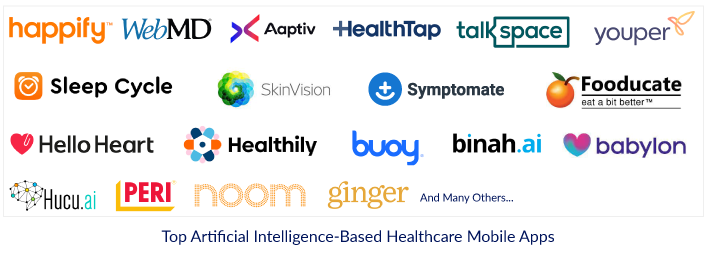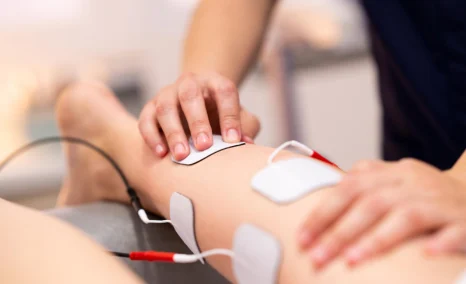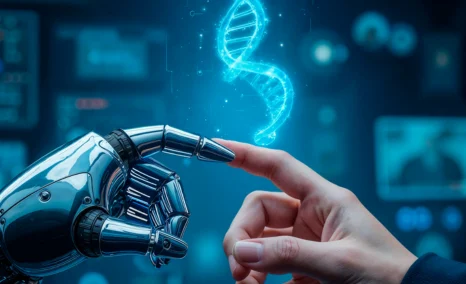Top Artificial Intelligence-Based Healthcare Mobile Apps and Their Use Cases
May 17, 2023
The role and application of Artificial Intelligence have grown at an immense pace in recent years. Globally, several companies including large & small scale businesses, education, retail, and telecommunications, among others are actively exploring opportunities to leverage the potential of AI in their organizations and improve service delivery. Government agencies are also using AI to design better policies, make accurate decisions, improve communication and engagement, and enhance the speed and quality of public services. Similarly, in the healthcare industry, companies and healthcare organizations are actively working to implement new AI-based tools and applications to improve healthcare delivery and enhance the user experience. The ability of AI to analyze a sizable number of data sets plays a crucial role in AI technology’s potential in the healthcare sector. Some of the key applications of AI such as in drug commercialization and drug discovery are gaining momentum. The growing adoption is leading to better health outcomes and increasing the organization’s efficiency and efficacy. Nowadays, the demand for Artificial Intelligence-Based Healthcare Mobile Apps is also on the rise and is exhibiting an unprecedented demand. The number of Artificial Intelligence-Based Healthcare Mobile Apps in the market has grown significantly in the last few years. New apps are being developed and launched by MedTech and HealthTech to cater to different needs.
Healthcare apps with artificial intelligence (AI) can be utilized to comprehend the nuances of the case and provide a suitable course of action. With rising awareness, Artificial Intelligence-Based Healthcare Mobile Apps are gaining popularity and attaining significant demand across different segments of society. The apps available in the market can perform specific queries of the user related to screening, diagnosis, and education. They can carry out specific processes and can also support tasks that can vary widely. The broad use of AI apps in healthcare is implied by the increase in the volume and complexity of health data and the growing awareness and demand.
Top Artificial Intelligence-Based Healthcare Mobile Apps in the Market
Artificial intelligence is not one technology, but rather a collection of them. Most of these technologies have immediate applicability and use in the healthcare field. It has the potential to transform many aspects of the healthcare industry, including patient care, as well as administrative processes within providers, payers, and pharmaceutical organizations. Several major AI-based algorithms have demonstrated a very high efficiency at spotting malignant tumors and guiding researchers, and constructing efficient and costly clinical trials. Moreover, several recent research studies have suggested that AI can perform as well as or better than humans at key healthcare tasks, such as disease screening and diagnosis, and suggesting appropriate treatment plans, among others.
Downloads
Click Here To Get the Article in PDF
Recent Articles
- Artificial Intelligence (AI) in Respiratory Care: An Opportune Time for Adoption in Clinical Sett...
- From Paper to Pixels: The Advantages and Challenges of Electronic Health Record
- Artificial Intelligence and Machine Learning in Software as a Medical Device (SaMD)
- Miracor Medical’s Picso Pivotal Study; Medtronic’s Extravascular ICD; Galaxy Medical’s CENTAURI P...
- AI Healthcare Startups: Unveiling Investment and Funding Trends
Some of the major Artificial Intelligence-Based Healthcare Mobile Apps that play a significant role in the healthcare industry include:
Noom
Noom is an AI-based healthcare app that is designed for people interested in living a healthy life with less body fat. The app gives the user expert advice after assessing their weight, age, height, and aim. Its weight loss program is designed by psychologists & scientifically proven to create real, sustainable results. Noom is based on the principles of psychology and the software uses a passive behavioral strategy that tricks your body into adopting a healthier lifestyle to stay fit. to persuade your body to adopt a healthy lifestyle in order to maintain your fitness.
Buoy
It is an AI-based intelligent symptom checker that uses next-generation technology. It listens and assists the person to make sense of symptoms as well as clarify your options for care. It does not provide the diagnostic option but gives the user a more accurate estimate of what might be making him feel unwell.
Hucu.ai
Hucu.ai is a free and HIPAA-secure patient-centered messaging network with real-time risk rating and staff appreciation. The app facilitates healthcare organizations and their staff to stay connected and streamline communication across your team and partner organizations. The users can share text, documents, images, emojis, and videos that are securely stored in the Hucu.ai encrypted cloud, reducing space utilization on user devices. Moreover, it comes with a deep analytics feature that has proven to drive effective care coordination and drastically improve patient outcomes.

SkinVision
SkinVision is a regulated medical service that gives the user greater control over the condition of their skin. It expands the ability to self-examine the skin condition and elevates the user’s knowledge of when to act, how, and why. With the SkinVision app, the user can immediately detect signs of the most common types of skin cancer, but it is not a diagnosis. It is designed to provide timely skin cancer detection and understanding of the major risk factors for skin cancer and keep track of your moles. The app can help in early treatment and better health outcomes. Moreover, it provides the most reliable personalized skin health advice and health path recommendation.
Sensely
Sensely is an empathy-driven conversational platform that acts as a virtual reality nursing assistant and assists in checking the patient, records the vital results, then funnels them back to the physicians. The app is empowered by world-class content, designed to enhance the member experience, elevate brand preference, and influence behavior. Moreover, it also enables enterprises to converse with their members in an entirely new way. It also offers consultations and preventive suggestions to warn of deteriorated health scenarios among patients and educates potential patients about illnesses and poor health conditions. The apps hold the potential to revamp the provisioning of remote healthcare to patients.
Binah.ai
Binah.ai is an AI-powered Health Data Platform that enables the user to measure a wide range of biomarkers using a smartphone, tablet, or laptop. It gives video-based health and wellness monitoring solutions and monitors medical-grade vital signs in real-time. Delivered as Binah SDK (Software Development Kit), the software can be integrated into any app or workflow. Some of the key biomarkers include blood pressure, heart rate, heart rate variability (multiple parameters and RRI raw data), oxygen saturation, breathing rate, sympathetic stress, parasympathetic activity, and pulse-respiration quotient (PRQ).
Ada AI Doctor
Ada AI Doctor is a “personal health companion and telemedicine app” that comes with a conversational interface. It is designed to support better health outcomes and clinical excellence with intelligent technology and help the user to work out what symptoms he/she has and offer you information on what might be the cause. Moreover, Users can check the symptoms online 24/7 and help with remote consultation with a real doctor over text.
Healthily
Healthily is the world’s first medically-approved platform designed to promote self-care. It is an AI-based app and is being built to cater to the personal needs of consumers, which is achieved by combining responsive AI tools and trusted insights. The user’s vital health states are studied by a team of doctors and healthcare professionals, who provide sensible recommendations using personalized ‘AI doctor’. Moreover, they can provide key suggestions for medicines and possible diagnoses for the health problem. Healthily is a go-to fitness app for many users due to its high level of accuracy in symptom tracking or any other health concerns.
Aaptiv
Aaptiv is a fitness workout app that provides audio-based workout programs and routines tailored to the user’s fitness goals. It is designed to provide a world-class fitness experience. The fitness program is created by expert personal trainers and allows the user to get good workouts quickly and easily. The app has various features and workout plans as per the fitness level, fitness goals, workout preferences, and available exercise equipment. After the successful completion of the workout, it awarded the user with badges, stars, confetti, and encouraging comments.
My Plate
MyPlate app is based on the concept of providing the fastest way to lose weight, improve the overall health of the user, and achieve a healthier lifestyle. It is a user-friendly app to track the user’s food content and monitor energy, protein, fat, and carbohydrate intake as well as a limited number of micronutrients and compare this to energy burnt by exercise. The healthcare program by My Plate is joined by millions of people who want to lose weight, and it can be accessed across different devices such as iPhone, iPad, Apple Watch, and Android. The user can track the real-time health progress and earn badges along the way. Moreover, it continuously delivers key insights on how to meet those goals.
Key Analysis and Perspective on AI-Based Healthcare Mobile Apps
Healthcare systems can benefit immensely from the adoption of AI, there is no doubt about it. Currently, most AI-based healthcare Apps can perform some of the basic functions that can free up clinicians’ schedules and reduce the burden on administrative departments, which helps healthcare organizations and physicians to interact more efficiently and effectively with patients and reduce the cost and time. With technological advancement, AI apps in the healthcare market are anticipated to have greater and more compelling applications in the future. Similarly, the data generated from the Apps can enhance data accessibility and can assist medical practitioners to take the appropriate precautions to avoid sickness and disease. Similarly, the diagnosis can be better and more quickly informed by real-time data with Artificial Intelligence-Based diagnosis apps. AI-Based apps can cut down on administrative errors and conserve important resources. However, AI still needs human supervision and has information and technical gaps, such as being susceptible to increasingly sophisticated cyberattacks. As AI is applied in the healthcare sector more and more, limitations and challenges must be tackled and overcome for a smooth user experience and to generate confidence.
Given the rapid advances in AI technology and, more and more companies and startups taking an interest in AI technology and its development, AI healthcare apps are expected to become more useful and aid in making more informed decisions in the coming years. Overall, Artificial Intelligence Mobile Apps in the healthcare sector are expected to have an influential role and improve the health outcome despite many obstacles and limitations.
FAQs
While AI healthcare apps offer valuable support in diagnostics and monitoring, they are not a substitute for professional medical advice. These apps are designed to assist healthcare providers by providing additional insights and streamlining administrative tasks.
Challenges in AI in healthcare apps include data privacy concerns, integration with existing healthcare systems, ensuring the accuracy and reliability of AI algorithms, and addressing ethical considerations related to AI decision-making.
Notable AI healthcare apps include Noom, Buoy, Hucu.ai, SkinVision, Sensely, Binah.ai, Ada AI Doctor, Healthily, Aaptiv, My Plate, and others. Each app offers unique features, including symptom checking, virtual consultations, and health assessments.
Notable players in the AI healthcare mobile app market space include Ada Health, Babylon Health, Your.MD, Sully.ai, HealthifyMe, and others. Tech giants such as Amazon, Nvidia, Microsoft, Apple, Google, Oracle, Salesforce, and Palantir are also investing heavily in AI healthcare solutions, ranging from diagnostics to administrative automation.
Downloads
Article in PDF
Recent Articles
- 22 Healthcare Trends & Innovations to Watch in 2022 and Beyond
- Can We Overlook The Potential Dangers That Come With AI In Healthcare?
- Artificial Intelligence and Machine Learning in Software as a Medical Device (SaMD)
- FDA Breakthrough Device Designation to Pi-Cardia’s ShortCut; AbSolutions Med’s REBUILD Bioabsorba...
- Most Promising Artificial Intelligence Applications in the Healthcare Segment




